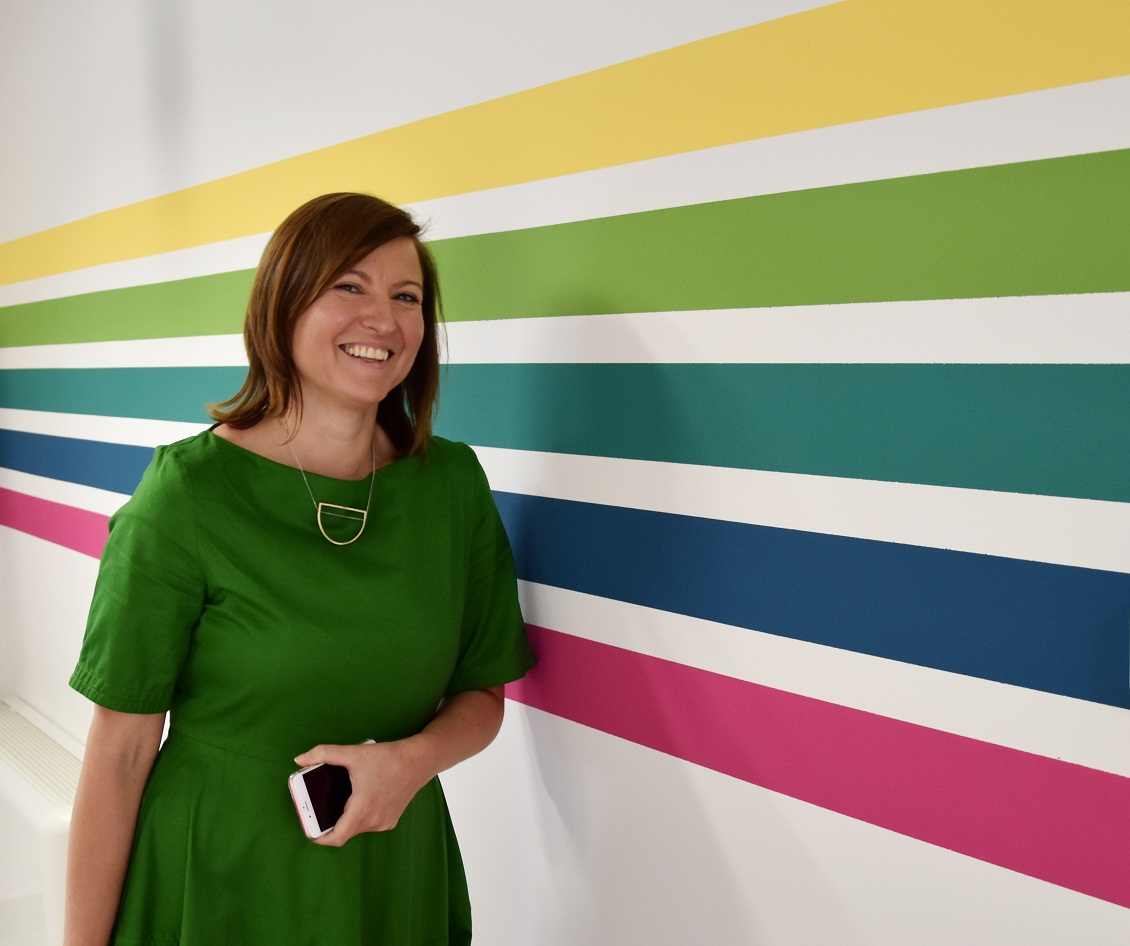This is an excerpt from an Interview with Elvira Kalmár made in 2017
How did you discover the solution focused (SF) approach?
It was a real WOW! experience, not only professionally, but also personally. It was during a tough time in my life, or I’d rather say I was on my way out of it, when SF found me. And the WOW! was not about how great this approach is. It was more like: “oh look at that, this is an approach?!” It is basically how I live my life.
I think SF – even if it came to me in this form – isn’t so much a coaching method, but a life philosophy. I’m only using it in coaching. I’ve also included it in my way of living.
How do you live it?
In many ways: already at work, in the way I’m present there. No matter what happens around me, my first thought is always to look for what can be useful and what we can make out of it. That means to take the positive approach before rushing to conclusions.
In my work as a leader this means that we don’t talk about what didn’t work, but instead we talk about what we did well, what has improved, or what kind of resources we discover in each other.
Of course others can of us like we are one of the happiest departments, a sunny island on the ocean of Telekom. As organization developers, we enter different areas, topics, and organizational units within the company. And because we work solution focused indirectly, we also introduce it to others by using it, and so it might be experience as something complete differently to others. I don’t think we advertise SF, but we are probably a kind of SF ambassadors by using it in every work we do.
Where is it seen?
In many smaller and bigger approaches and techniques: For example, we always start the planning of a new project with the common dream – we define what we want to be proud of in the end.
Another example is that everyone in the team can easily notice who did what well and where they made progress. It was important for me in the beginning to create the setting for this. But today, two years later, the team works with this approach all by itself. It’s an important part of our weekly meeting that everybody shares what he or she is proud of, in terms of what they have moved forward or improved. Sometimes we also do “positive gossiping” or “resource gossiping”.
I have biweekly one-on-ones with every team member: these are kind of solution focused coaching conversations in many respects. They don’t necessarily have to be SF conversations, but we talk about individual dreams, wishes for their personal professional development, we notice recourses and sometimes we evaluate with a SF scale.

Elvira Kalmár
Senior Change Management Team Leader, Magyar Telekom
Elvira Kalmár arbejder pt. med at opbygge intern OD&D kapacitet hos Magyar Telekom, hvor hun leder et stærkt og passioneret team.
På konferencen kan du opleve hende i en workshop med titlen: The Solution Focused Ripples of IMPACT.
Where else is it seen?
For example in the way I got into my current scope of activities. It started when they couldn’t prolong my contract at T-Systems because of reorganization. They centralized the HR department, and created a whole internal team at Telekom based on what I had done so far as an external consultant.
I could have gotten sad, or could have looked for a new job and new customers, which would have been quite a long process. Instead I started to get enthusiastic: Wow, they are building a whole team based on my work?! Couldn’t I just join? I couldn’t, because the team was already filled. Suddenly it turned out, that although the team was filled, it didn’t yet have a leader, so I asked: What if I joined as the leader? Both sides were happy about this opportunity, and now I’ve been here for two years already.
Promotion instead of a dismissal?
Yes, and I feel that I also introduced this kind of movement to the team. How can we detect the opportunities, and dare to believe that miracles can come true! This team came about as a result of a tough company reorganization, and many experienced what it meant for their tasks and activities as a demotion.
One of my first steps was to convince the team to start dreaming. Partially individually: What is the “perfect future” for each of the team members, and how can their new position add to this? And partially as a team: What do we dream about together, and how can we achieve it? What was visible back then is about 10% of what we do now. But we needed time to build that self-confidence, courage and professionalism that brought us here.
Is it possible that dreaming is your SF technique?
This question of “a miracle” or “the perfect future” (see video below) – is all about dreaming for me. And the word ‘dreaming’ itself is important. If you ask yourself: “What would be a good solution for you, what would be ideal here?” – we answer with our brain and our answers contain limitations, the box or frame in which we are used to think. But a dream is surreal, we can include anything.
I experience that teams often surprise themselves by dreaming: they realize that they have common dreams. Not plans: dreams. And there’s a huge difference. Before I knew SF, I still had dreams with the companies I worked with. Today I know better why this works.
Then SF brought you awareness?
Which also gave me courage. As a consultant and organizational developer, I had already learned and utilized a lot before. Through the years it became clear to me what works, but since knowing that what I learned from experience in fact is an existing method, I’ve been using it more consistently, and I dare to bring it to its limits.
For example, you can bring the use of feedback about resources and encouragement to a level where there is nothing else. You can host a trainer education program without any negative feedback or any feedback about things to be developed.
It’s not just about the fact that there is positive feedback instead of negative. It’s a completely different mindset. This is why I usually don’t use the expression „solution focused“, because it sounds like the opposite of problem focused, as if these were the two ends of a scale. But SF works because it leaves this scale. It shows another paradigm and this unfolds plenty of opportunities.
How exactly does this unfold?
Lately I’ve worked a lot with perceptions at Telekom. It’s exciting, because some perceptions often appear very spectacularly. Like when the organization chart is deep in the minds of the colleagues, and they imagine the organizational silos so much, it doesn’t matter if they sit right next to each other, they just don’t turn to each other.
We have an open office, so there aren’t any walls – physically. But mentally there are a lot of walls – the silo thinking. If we move away silo thinking and towards dreams and opportunities, we immediately see that we don’t have to go to the director to say something to a colleague in another department. We can just walk straight over to them and talk directly – also what we appreciate in them.
Where else do you use SF, except in your role as a consultant?
I also live my private life like this. With the kids we don’t talk so much about what is, but more about what we want and how we notice progress in that. But all of this doesn’t mean that I’m never frustrated or angry. Of course I am. I’m a normal parent. In these situations I try to say what I want instead of what makes me angry.
My partner is a coach with a SF approach, so we aren’t able to think in other ways than SF. I think the most important thing about this is that we both believe that we create our own reality. It really depends strictly on each one of us what our relationship becomes. Not on life, on circumstances, or on our former partners, but on us. We know that our intents and dreams lead in one direction.
Therefore we can also imagine in completely surreal situations, that the current (uncomfortable or tough) moment leads to something that will be better for us. We also know that if we searched for flaws in each other, we would find them. But we are more interested in the lovable sides of each other, shine and pride.
Where else do you see this kind of SF approach in your boldest dreams?
I’m interested in the whole of humanity. I’ve been working a lot with teams and bigger organizations these days, and I see what the collective consciousness – for example 8.500 people at Telekom – is able to dream. Where could this lead to in public life, in society?!
Working in an ICT company I know exactly in what speed we move forward on the path of digitalization and AI. But I’m sick of those visions like in The Matrix or other science fiction movies, where we project how AI is going to take over power from us.
Why do we imagine this kind of future, and why do we accept it? What would an ideal world look like, if we dream together?
Footnote When talking about dreaming in SF we also talk about "Miracle Questions" (see video below)

